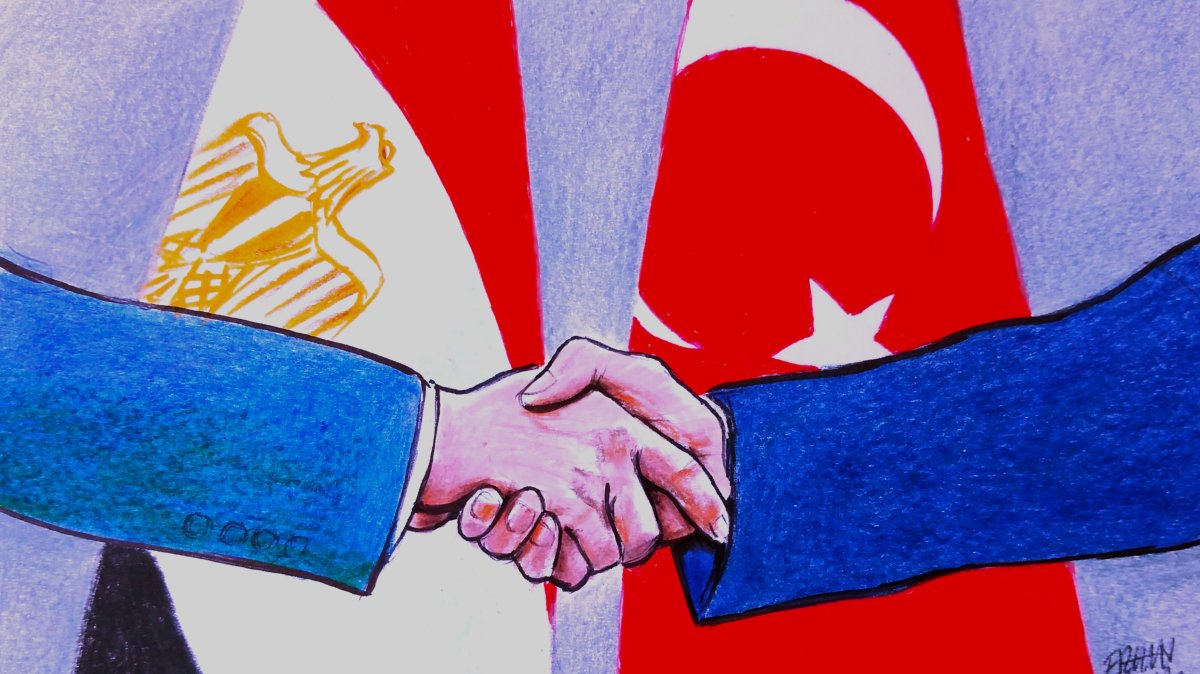After a decade marked by diplomatic tensions, the bilateral relations between Türkiye and Egypt have embarked on a path of normalization, driven by the mutual resolve of their respective leaders. In 2024, reciprocal visits by the heads of state to each other’s capitals signaled the commencement of a new chapter in their diplomatic engagement. A principal impetus for this rapprochement lies in the recognition of the unsustainability of their previously conflicting stances within regional politics. This reality has been underscored by the considerable costs incurred by both nations as a result of pursuing competitive policies in various crisis zones. Moreover, the persistent failure to establish enduring stability in these areas despite such efforts and expenditures has further highlighted the need for change.
Against this backdrop, adopting cooperative approaches rather than competitive ones in critical regions, including the Eastern Mediterranean, Libya, Sudan and Syria, holds the potential to generate mutual benefits. Additionally, enhancing collaboration across sectors such as defense, security, military affairs and the economy would serve the interests of both Türkiye and Egypt, particularly as they face pressures from traditional powers like the United States due to their pursuit of autonomous foreign policies.
Rapprochement of Türkiye, Egypt
The renewed rapprochement between Türkiye and Egypt has already produced tangible policy outcomes at both regional and global levels. These include a shared stance opposing Israel’s military aggression in Gaza, coordinated foreign policy initiatives in crisis-affected areas such as Libya, Sudan and Somalia, increased economic and social exchanges, and notably, accelerated cooperation within the defense industry. These developments reflect a shift in attitudes and concerted efforts by the leadership of both countries. The transition from competition to cooperation, and from divergent foreign policy positions to the formulation of common strategies, has been facilitated by intensified diplomatic engagement, particularly through the active involvement of the two nations’ Foreign Ministers.
In this regard, Foreign Minister Hakan Fidan’s three visits to Egypt over the past year exemplify Türkiye’s commitment to advancing bilateral relations. Each visit has resulted in concrete measures aimed at deepening cooperation and has reinforced the operationalization of established mechanisms designed to sustain this progress. The most recent visit, conducted in August 2025, included meetings with Egyptian President Abdel-Fattah el-Sissi, Egyptian Foreign Minister Badr Abdelati and Arab League Secretary-General Ahmed Aboul Gheit. Discussions during this visit focused on regional challenges, with particular emphasis on the situation in Gaza, as well as on strengthening bilateral ties.
Israeli threat to Middle East
Among various concerns, the principal issue confronting both Türkiye and Egypt is the Israeli military aggression in Gaza. During a joint press conference, the respective ministers underscored the urgent need for an immediate cease-fire and the provision of humanitarian assistance to the affected civilian population. The ministers’ explicitly critical stance toward Israel reflects a shared policy approach adopted by both countries on this matter. Indeed, Ankara and Cairo are widely regarded as key actors advocating for Palestinian rights at a time when Gulf states exhibit relative indifference and the United States maintains unequivocal support for Israel. This issue holds particular significance for Türkiye, as evidenced by President Recep Tayyip Erdoğan’s pronounced opposition to Israeli actions. Ankara’s intensified collaboration with other Arab and Islamic nations in the region to counter Israeli measures further highlights its proactive role.
Concurrently, Egypt faces mounting pressure from both domestic constituencies and regional public opinion to adopt a more assertive position regarding the Palestinian crisis, especially in light of the escalating humanitarian emergency in Gaza. The Israeli government’s plans, endorsed by then-U.S. President Donald Trump, to compel the displacement of Gaza’s population into Egyptian territory have exerted considerable strain on Cairo. In response to these pressures, President Abdel-Fattah el-Sissi has been compelled to navigate a cautious diplomatic path to preserve Egypt’s strategic relationships with the U.S. and Gulf countries. Simultaneously, the el-Sissi administration is endeavoring to establish a unified front against Israel through enhanced cooperation with Türkiye.
Another dimension of bilateral relations that has gained prominence recently is defense industry collaboration. Despite possessing one of the largest military forces globally, Egypt faces limitations in defense technology capabilities and military inventory. These constraints arise from procurement challenges linked to foreign policy divergences, economic resource limitations, and difficulties in military modernization. Notably, periodic political disagreements with the United States have raised questions regarding Washington’s reliability as a military partner for Cairo. This issue resurfaced in March 2025 when the U.S. administration announced a reduction in military aid to Egypt, citing disagreements over the Gaza conflict. The Trump administration’s decision, set to take effect in 2026, was identified as a key factor influencing the Egyptian government’s opposition to the forced displacement of Gaza’s population.
Collaboration in defense sector
The prospect of strategic collaboration between Egypt and Türkiye within the defense sector has become increasingly apparent. The concept of joint production and utilization of Türkiye’s indigenous fifth-generation KAAN fighter jet, initially proposed by Egyptian President el-Sissi during his visit to Türkiye in September 2024, has recently advanced considerably. Subsequent to engagements between the respective military staffs, Egyptian Chief of General Staff Ahmed Khalifa conducted a visit to Türkiye in May, during which he examined Ankara’s cutting-edge defense technology products, with particular emphasis on the KAAN project. Continued interactions following this visit have expedited efforts to enhance cooperation between the two nations concerning the joint production of the KAAN fighter jet as well as other military equipment. Reports from international media suggest that formal agreements in this domain may be finalized by the end of 2025.
These interactions suggest that the future trajectory of Turkish-Egyptian relations will adopt a strategic framework characterized by multi-sectoral cooperation. Such collaboration is likely to draw the interest of other regional stakeholders who prioritize stability and peaceful development. In this context, it can be posited that Ankara and Cairo possess the potential to spearhead the formation of a new regional order, notwithstanding opposition from certain regional and international rival factions.

